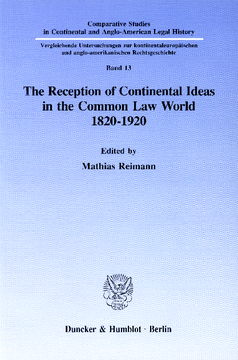The Reception of Continental Ideas in the Common Law World 1820–1920

BOOK
Cite BOOK
Style
Format
The Reception of Continental Ideas in the Common Law World 1820–1920
Editors: Reimann, Mathias
Comparative Studies in Continental and Anglo-American Legal History, Vol. 13
(1993)
Additional Information
Book Details
Pricing
Table of Contents
| Section Title | Page | Action | Price |
|---|---|---|---|
| Inhaltsverzeichnis | 5 | ||
| Mathias Reimann: Introduction: Patterns of Reception | 7 | ||
| Michael H. Hoeflich: Roman and Civil Law in the Anglo-American World Before 1850: Lieber, Legaré and Walker, Roman Lawyers in the Old South | 19 | ||
| Alan Watson: Chancellor Kent’s Use of Foreign Law | 45 | ||
| I. | 45 | ||
| II. | 49 | ||
| III. | 52 | ||
| IV. | 61 | ||
| David S. Clark: The Civil Law Influence on David Dudley Field’s Code of Civil Procedure | 63 | ||
| I. The Ideology of Codification | 66 | ||
| II. The Form of Codification | 75 | ||
| III. The Substance of Codification | 81 | ||
| IV. Assessment of the Civil Law Influence | 86 | ||
| Stefan Riesenfeld: The Impact of German Legal Ideas and Institutions on Legal Thought and Institutions in the United States | 89 | ||
| I. The Channels of Transmission | 89 | ||
| II. Basic Notions and Methods of German origin finding acceptance in the United States | 92 | ||
| III. Methods of Resolving Conflicts: Jurisprudence of Interests | 94 | ||
| IV. Acceptance of German Legal Institutions | 96 | ||
| Conclusion | 97 | ||
| Richard M. Buxbaum: The Provenance of No-Par Stock: A Comparative History | 99 | ||
| Introduction | 99 | ||
| I. | 100 | ||
| II. | 106 | ||
| III. | 107 | ||
| IV. | 111 | ||
| Conclusion | 114 | ||
| Michele Graziadei: Changing Images of the Law in XIX Century English Legal Thought (The Continental Impulse) | 115 | ||
| I. Introduction | 115 | ||
| II. Civil Law Dresses for the Common Law | 122 | ||
| 1. Trusts and the Roman Law | 122 | ||
| 2. Consideration in Contracts | 129 | ||
| 3. Bailments and Degrees of Negligence | 135 | ||
| 4. Bailments and Possession | 139 | ||
| III. The Emperor Has No Clothes | 141 | ||
| IV. The Return of the Anglo-Saxons | 149 | ||
| V. The "Englishry of English Law" | 158 | ||
| Mathias Reimann: A Career in Itself. The German Professiorate as a Model for American Legal Academica | 165 | ||
| Introduction | 165 | ||
| I. The Elements of the Model: Three Dimensions | 169 | ||
| 1. Professional Expertise: "The Learning of a German Professor" | 169 | ||
| 2. Specialized Responsibility: "A Wholesome Influence Upon the Development of the Law" | 177 | ||
| 3. Institutional Status: " They Have Always Been University Men" | 183 | ||
| II. The Attraction of the Model: Three Contexts | 188 | ||
| 1. The Professionalization of Jobs | 188 | ||
| 2. The Specialization of Functions | 190 | ||
| 3. The Institutionalization of Science | 192 | ||
| III. The Fate of the Model: Three Developments | 194 | ||
| 1. The Decline of the Image | 194 | ||
| 2. The Effects on Legal Academia | 198 | ||
| 3. The Impact on the Legal Culture | 200 | ||
| James Ε. Herget: The Influence of German Thought on American Jurisprudence, 1880-1918 | 203 | ||
| Jhering | 205 | ||
| Jhering’ Influence on the Americans | 207 | ||
| The European Sociologists | 209 | ||
| Gumplowicz | 210 | ||
| Gumplowicz’ Influence on the Americans | 210 | ||
| Simmel | 211 | ||
| Simmel’s Influence on the Americans | 212 | ||
| Ratzenhofer | 212 | ||
| Ratzenhofer’s Influence on the Americans | 213 | ||
| From Sociology to Jurisprudence | 214 | ||
| The Free Law Thinkers | 215 | ||
| Influence of Free Law Thinking on the Americans | 221 | ||
| The "New" American Legal Theory | 227 | ||
| James Q. Whitman: Early German Corporatism in America: Limits of the "Social" in the Land of Economics | 229 | ||
| I. | 230 | ||
| II. | 236 | ||
| III. | 240 | ||
| IV. | 243 | ||
| V. | 248 | ||
| Verzeichnis der Mitarbeiter | 253 |
